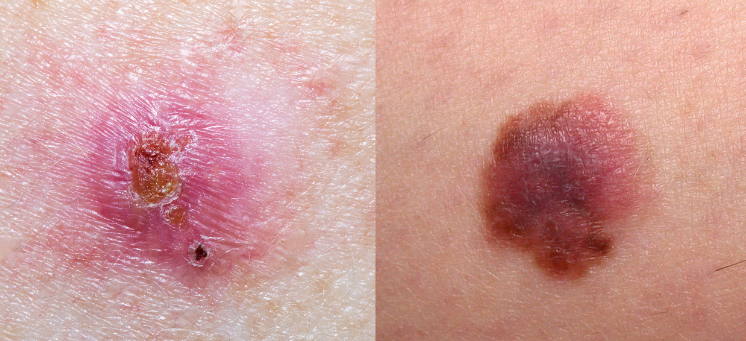General
Skin cancer: Stages, Diagnosis, Outlook

Skin cancer is a type of cancer that begins in the skin cells. There are different types of skin cancer, with the most common being basal cell carcinoma, squamous cell carcinoma, and melanoma. Each type has its own characteristics, stages, and prognosis. Here’s an overview of the stages, diagnosis, and outlook for skin cancer:
Stages of Skin Cancer:
- Basal Cell Carcinoma and Squamous Cell Carcinoma:
These are the most common types of skin cancer and are often grouped together.
Staging is often based on the size and depth of the tumor, whether it has invaded nearby tissues or lymph nodes, and whether it has spread to other parts of the body.
Stages:
- Stage 0 (In Situ): Abnormal cells are present but have not invaded surrounding tissues.
- Stage I and II: The cancer is small and localized to the skin.
- Stage III: The cancer has spread to nearby tissues or lymph nodes.
- Stage IV: Cancer has spread to distant organs or lymph nodes.
- Melanoma:
Melanoma, a more aggressive form of skin cancer, is staged using the TNM system (Tumor, Node, Metastasis).
Stages:
- Stage 0 (In Situ): The cancer is only in the outer layer of skin.
- Stage I: The tumor is thin and has not spread.
- Stage II: The tumor is thicker, and there may be some ulceration.
- Stage III: The cancer has spread to nearby lymph nodes.
- Stage IV: The cancer has spread to distant organs or lymph nodes.
Diagnosis:
Skin Biopsy:
A small piece of the suspicious skin is removed and examined under a microscope to determine if cancer cells are present. This procedure can be performed by a Dermatologist in Islamabad.
Imaging Tests:
If melanoma is suspected to have spread, imaging tests like CT scans, MRIs, or PET scans may be conducted.
Lymph Node Biopsy:
If lymph nodes are enlarged, a biopsy may be performed to check for cancer cells.
Outlook (Prognosis):
Basal Cell Carcinoma and Squamous Cell Carcinoma:
- These cancers are generally slow-growing and rarely spread to other parts of the body.
- The prognosis is excellent, especially when detected and treated early.
Melanoma:
- Early detection is crucial for a better prognosis.
- The prognosis depends on the stage at diagnosis. In early stages, the five-year survival rate is high, but it decreases as the cancer progresses.
Treatment:
Treatment options vary based on the type and stage of skin cancer:
- Surgery: Most skin cancers are treated with surgery to remove the cancerous tissue.
- Radiation Therapy: Used in some cases to destroy cancer cells.
- Immunotherapy and Targeted Therapy: For advanced melanoma, new treatments like immunotherapy and targeted therapy may be recommended.
Regular skin checks, protection from UV radiation, and early detection are crucial for improving the prognosis of skin cancer. If you notice any changes in your skin, such as new moles, changes in existing moles, or other abnormalities, consult with a Skin Specialist in Lahore for a thorough examination.






















